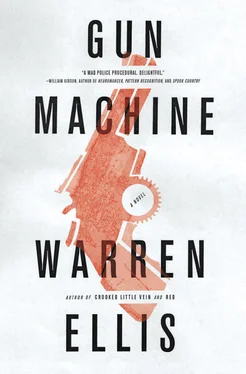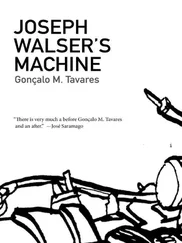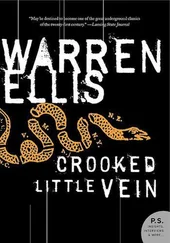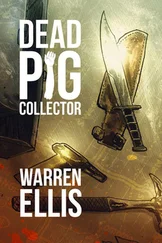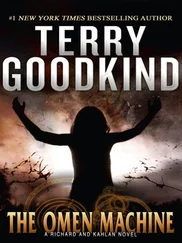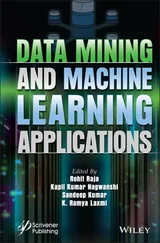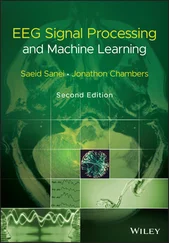“What? Why would I?” Tallow said, thinking, Let’s see .
“It’s, it’s just not safe. I worry that maybe I made you think about it.”
“Your husband went back to work?”
“Yes. He doesn’t know I’m calling you. I suppose he might when he gets the phone records, you know, the itemized billing. But I’m calling to thank you.”
“Mrs. Westover, I meant to ask earlier. That brooch on your jacket. What is it?”
“It’s an elk symbol. It’s…do you promise not to laugh?”
“I promise,” he said, letting her hear the smile in his voice.
“It’s protective. Protective magic. In Native American medicine, the elk protects you from the unknown.”
Tallow felt a sudden crest of deep pity for Emily Westover. That brooch must have cost her five hundred dollars. She probably had a stack of CDs and a drive full of MP3s that were no more Native American than the pap she was playing right now. He couldn’t help but think of Vivicy, of the mysterious wizards Machen hired but understood not at all, of the office that spoke of money without the basic grasp of aesthetic and arrangement that nature bestowed on even the common rat, and of the music that evoked some prefab heaven whose furnishers shopped at off-brand stores.
So there she was, living in a fiction, her wealth buying her nothing but pretty fakes, locked in a glass castle where all the guards worked for her husband.
“I see,” he said. “Mrs. Westover, why don’t you tell me what you’re really worried about?”
She was trying to tell him, in her damaged way, that she knew. She had somehow found out that Westover and the killer were connected, and she was unable to do anything with that knowledge. It broke her. All she could do was learn as much as possible about what little she’d found out. She’d tried to learn about Native Americans. The sum of her achievement was that she was now scared of everything.
She gave that broken-glass laugh again. “The things I’m really worried about. Good God, Detective, I could be on this call all day. But then I think, you know, what do I have to be worried about? I’m surrounded by everyone I know. It’s just that sometimes it feels like, well, I’m surrounded by everyone I know. If you know what I mean. I say that a lot. I worry that people don’t always know what I mean, these days. I don’t think I speak as clearly as I used to. Or think as clearly. But that’s hard, because life was always simpler before, and there just weren’t as many things to think about. It’s like, walking through the city, on sidewalks, you only have to think about one thing at a time. But if you’re walking a deep forest trail, you have to think about three or four things at the same time—”
“I’ve never walked a deep forest trail,” said Tallow. “Do you get to the countryside much?”
“I wish people could see what I meant,” Emily said, sounding wistful. Her mood seemed to Tallow to be changing by the moment, and her voice was all but doing the scales. He thought of Bobby Tagg and clamped his lips shut against a surge of bile.
“We all say it, don’t we?” she said. “We say ‘I see what you mean,’ it’s the metaphor for clarity. But sometimes I wish people could see the pictures in my head, instead of my having to describe them with words. Words are clumsy. I wish I could communicate in pictures.”
“Like wampum belts,” Tallow tried, experimentally.
“I just wanted a friend who didn’t report to my fucking husband!” she screamed, and killed the call.
Tallow looked at the phone for a moment, debating whether or not to call her back, apologize for whatever he said or did wrong. He convinced himself that pretty much anything could have set her off. He’d think about it later. Her number was logged in his phone, and he added the number to a contact page and saved it.
The main office was full of people, none of whom would look at Tallow as he entered. The lieutenant’s office had all its blinds down. Tallow stood in front of his lieutenant’s office door, and knocked.
“I said this was a private meeting.”
“I wasn’t here for that, ma’am. Sorry.”
“Tallow? Is that you?”
“Yes, ma’am.”
“Come in, please.”
Tallow opened the door, feeling the eyes of the people in the outer office on his back. It was apparently safe for them to look at him when he couldn’t look at them.
“You’re awfully polite for a maverick cop on the edge, Detective,” said the captain with a smile, putting out a fragile hand. His fingers seemed to move in the wind like brittle, vine-choked branches.
“The only thing I’m on the edge of is dinner hour, sir. Hello.”
“John doesn’t do the rulebook-chewing-mad-dog-cop thing so well,” said the lieutenant from her desk chair. “Honestly? He’s far too lazy for that.”
“You’re lucky I know she’s joking,” said the other man in the room. That man did not extend his hand. He seemed to be expecting something.
“Assistant Chief,” Tallow said, offering his hand.
Assistant chief Allen Turkel was the commanding officer of Manhattan South, with ten precincts under his oversight, including the 1st. His two stars were very well polished. So well polished, in fact, that it looked to Tallow like he’d had to retouch the gold.
“Detective,” the assistant chief said, with the barest incline of a nod and a weak, cursory shake. Tallow had the impression the man was holding out for a salute. He had the posture of a man who regularly sucked his stomach in. “I imagine you’re here to talk to your lieutenant about your charming apartment on Pearl Street.”
“Among other things, sir, yes.”
Two plastic chairs were out, for the captain and the assistant chief. There wasn’t a third one. They returned to their chairs. Tallow chose to stand with his back to the closed door, a position that had him facing their profiles. He clasped his hands behind him, reading the room.
The assistant chief chose to address the lieutenant. “You have a very smart lieutenant here, you know that, Detective? Smartest lieutenant of detectives in my whole borough. I like to think that one day she’s going to be working with me at One PP. And then I think, Why would I take my smartest lieutenant out of the line where she’s doing the most good? ”
He laughed. The lieutenant chuckled. Something like the sound of dry twigs snapping came out of the captain’s mouth. The assistant chief’s intended meaning escaped nobody. He checked his watch while everyone else dutifully faked amusement. Tallow eyed the watch. It looked like a Hublot, a Swiss device in brushed rose gold, and a bezel and dial in black ceramics, decorated in screws, grilles, and pistons that evoked the 1920s science-fiction constructivist aesthetic of the film Metropolis . The strap was black rubber. It wasn’t a policeman’s watch. It was a fetish object. Tallow had read that Hublots now came with electronic security cards so that you could prove on the Internet that you owned them.
“I appreciate that, sir,” the lieutenant said. “And I appreciate you coming all the way over here personally. You didn’t have to do that.”
Tallow didn’t smile at the well-planted stroke, but he wanted to.
“Oh, I did, I did,” the assistant chief proudly faux protested. “It’s my borough. It’s my call. I just felt you were entitled to a direct explanation about all this.”
“Well, thank you.”
“Oh, no need, no need. I mean, you know, Charlie here”—indicating the captain—“knows that I’ll give you anything you need to get a job done. But we also have to be attentive to the way of the future. And a case like this one—oh, yes, yes, Charlie, I know it’s a nightmare—we have to be attentive to resources. Evidence Collection Teams were a good idea, and they help balance the load, but a case like this one completely knocks that out of whack.”
Читать дальше
